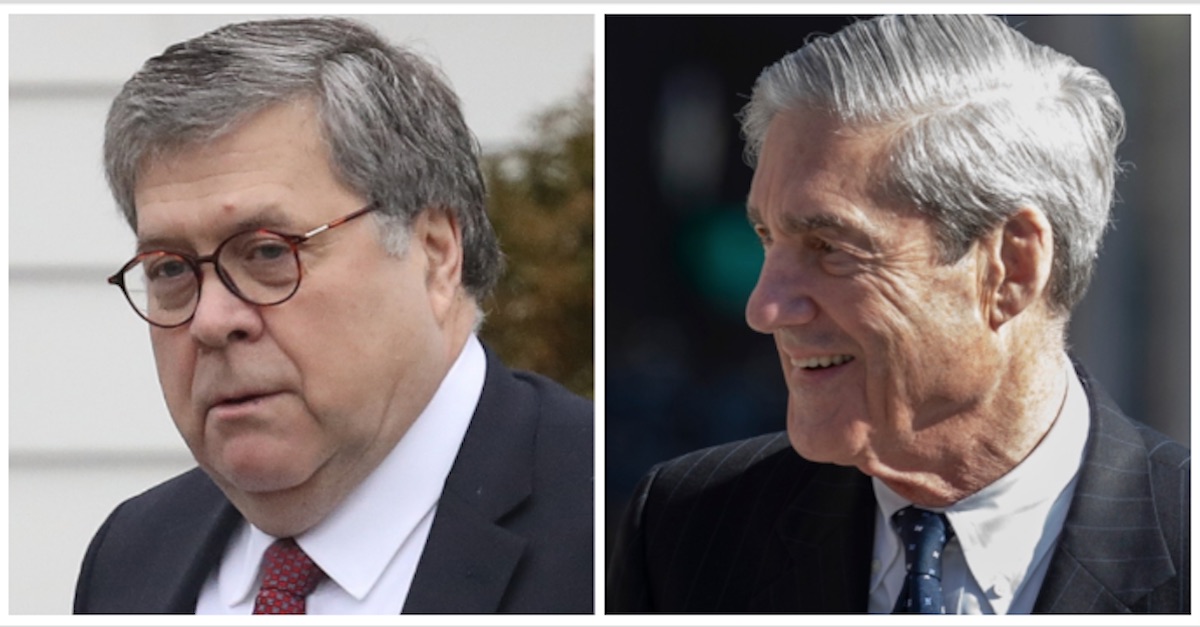
Despite intense skepticism of Attorney General William Barr‘s four-page summary of the “principal conclusions” contained in Special Counsel Robert Mueller‘s much-anticipated Russia report, no one from the Special Counsel team has pushed back — until now. Some of Mueller’s investigators, the New York Times reports, have expressed that they felt Barr “failed to adequately portray the findings of their inquiry and that they were more troubling for President Trump than Mr. Barr indicated.”
According to the Times, the unnamed investigators expressing misgivings are concerned that Barr is shaping a narrative about the report in advance of its actual release:
At stake in the dispute — the first evidence of tension between Mr. Barr and the special counsel’s office — is who shapes the public’s initial understanding of one of the most consequential government investigations in American history. Some members of Mr. Mueller’s team are concerned that, because Mr. Barr created the first narrative of the special counsel’s findings, Americans’ views will have hardened before the investigation’s conclusions become public.
Mr. Barr has said he would move quickly to release the nearly 400-page report but needed time to scrub out confidential information. The special counsel’s investigators had already written multiple summaries of the report, and some team members believe that Mr. Barr should have included more of their material in the four-page letter he wrote on March 24 laying out their main conclusions, according to government officials familiar with the investigation. Mr. Barr only briefly cited the special counsel’s work in his letter.
This bit here makes clear that the Special Counsel itself summarized its report “multiple” times, but that the one Barr wrote was something else.
Why?
Again, per the Times:
However, the special counsel’s office never asked Mr. Barr to release the summaries soon after he received the report, a person familiar with the investigation said. And the Justice Department quickly determined that the summaries contain sensitive information, like classified material, secret grand-jury testimony and information related to current federal investigations that must remain confidential, according to two government officials.
Barr previously announced that he received the Mueller report and expected to quickly speak on the report’s “principle conclusions.” Days later, Barr released a summary, and it said: Mueller has no more indictments, Mueller did not allege conspiracy between President Donald Trump/Trump campaign and the Russian government, and Mueller didn’t exonerate Trump of obstruction of justice but didn’t allege it either.
The length of the summary (four pages), how quickly it was produced, and the fact that there were no conspiracy charges led to a bit of a frenzy, but so did the fact that Trump wasn’t exonerated of obstructing the Mueller investigation. After the negative response to his summary, Barr told lawmakers that he thought it went without saying that this was not an “exhaustive” account of Mueller’s investigation.
“As my letter made clear, my notification to Congress and the public provided, pending release of the report, a summary of its ‘principal conclusions’–that is, its bottom line,” he said.
But the bottom line appears to be that this isn’t necessarily the bottom line, at least to some of the people who actually worked the Mueller investigation. The Times also suggested Barr is thoroughly aware of fired FBI Director James Comey‘s “no reasonable prosecutor” press conference regarding the Hillary Clinton email investigation, and didn’t want to repeat that — “[H[e and his aides limited the details they revealed because they were worried about wading into political territory.”
The investigators that were the source of this pushback did not go into further detail about why Trump may be in more trouble than Barr let on, but it stands to reason that it has to do with the obstruction of justice element of the investigation.
As Law&Crime has noted before, reports for past independent counsel investigations like Iran-Contra and the Ken Starr investigation into Bill Clinton included a 1-page introduction that went into great detail about the findings of the prosecutors. Barr’s summary was not that.
[Images via Win McNamee/Getty Images, Tasos Katopodis/Getty Images]